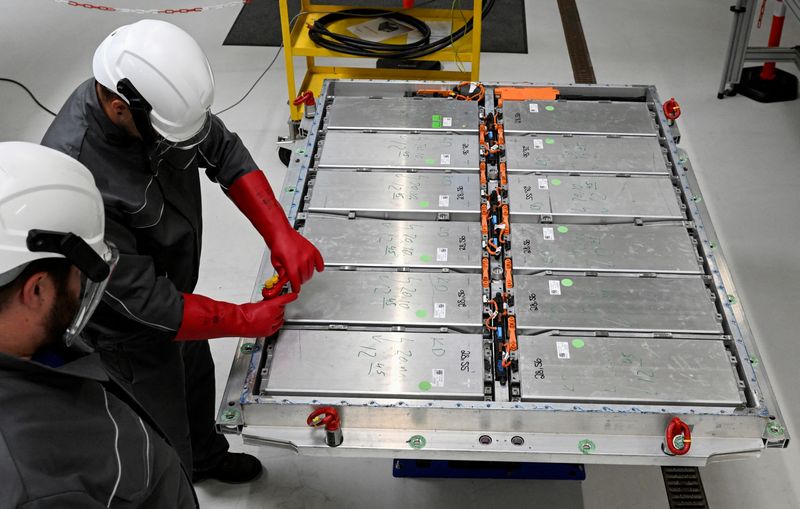By Andreas Rinke and Sarah Marsh
BERLIN (Reuters) - Building a lithium-ion battery factory in Germany, Europe's top car producer, had seemed like a no-brainer for Northvolt. But a new U.S. law offering hefty subsidies to local manufacturers of green technology has given the company pause for thought.
Chief Executive Peter Carlsson said that under the Inflation Reduction Act (IRA), Swedish-based Northvolt could get up to 800 million euros ($836 million) in U.S. state aid to build a factory making the batteries used in electric vehicles.
That is roughly four times what the German government is offering, he said, with cheaper energy prices in the United States on top. As a result, the company is considering delaying its plans to build a factory in Heide, northern Germany.
"We are now at a point where we may prioritise expansion in the U.S. over Europe first," said Carlsson.
Other company executives have echoed that sentiment in recent weeks, adding to signs that the $430 billion IRA, signed into U.S. law in August, is starting to lure investments in green technology away from Europe's manufacturing powerhouse.
The act introduces tax credits related to investment in green technology, plus tax breaks for consumers buying an electric vehicle or other green product made in North America.
German carmakers and suppliers, for which the United States is a main export market, are among its biggest victims.
An October survey by the German Chambers of Commerce and Industry (DIHK) showed 39% of companies wanted to increase investment in the United States compared with 32% for Europe.
And DIHK's trade chief Volker Treier told Reuters the U.S.-German Chambers of Commerce had seen increased German investment in the United States, especially in the auto sector.
"If we don't do anything, a lot will emerge in the United States," said Siemens Energy Chief Executive Christian Bruch. "The risk of migration is there."
German Economy Minister Robert Habeck, of the Greens party, told Handelsblatt newspaper there was a danger "the next wave of technological innovation does not take place in Europe" - innovation key to helping Europe exit its energy crisis.
Industrial jobs could "disappear from Germany and Europe", the head of the ruling Social Democrats (SPD) Lars Klingbeil told Reuters.
EUROPE, USA WRANGLE OVER EXEMPTIONS
Habeck and his French counterpart Bruno Le Maire last week urged a strong European response to the IRA, which they said violates World Trade Organization rules.
No country has yet officially launched a legal challenge against the IRA with the trade body, although both China and Russia raised concerns about it during an Oct. 25 WTO meeting on subsidies.
Europe and the United States, which aim to project a united front in the face of Russia's war on Ukraine, are negotiating possibly reversing parts of the act or seeking exemptions for European companies modelled on those for Mexico and Canada.
French President Emmanuel Macron will try during a state visit to the United States this week to convince Washington it is not in its interests to weaken European companies while Western allies are facing intense competition from China.
"U.S. autos trade unions also say that one should differentiate between cars produced in China and those produced in Germany with our tariff conditions," Klingbeil said following a trip to the United States.
The matter is expected to be addressed at a meeting of the EU-U.S. Trade and Technology Council on Dec. 5.
INDUSTRIAL POLICY REVAMP NEEDED?
In Germany, criticism of European complacency and calls to introduce measures to boost competitiveness as growing.
"Quicker decisions (on projects), subsidies ... other financial support for companies" are some possible solutions, Habeck said.
Europe has its own large subsidies available for investment in green technology, he said - the problem is mobilizing them in a timely manner and obtaining the necessary permits from local and national authorities.
That is one reason CMBlu Energy, a German company that has developed batteries for green energy that do not require special critical minerals, has decided to build its first factory in the United States, Chief Executive Peter Geigle told German paper Frankfurter Allgemeine Zeitung.
"We were going to have to change our industrial policy anyhow as we are under enormous time pressure," Habeck said. "We cannot afford construction times of 12 years for a hydrogen plant."
Volkswagen (ETR:VOWG_p) brand CEO Thomas Schaefer accused the European Union on Monday of "sticking to outdated and bureaucratic state aid rules that promote regions rather than preserving and transforming entire industrial sites".
New strategic instruments like the Important Projects of Common European Interest (IPCEI) focused on "the long-term development of new technologies rather than the short-term ramp-up, scaling and industrialisation of production", he wrote on LinkedIn.

"The EU urgently needs new instruments to avert insidious de-industrialisation," Schaefer said. "We have no time to lose."
($1 = 0.9571 euros)